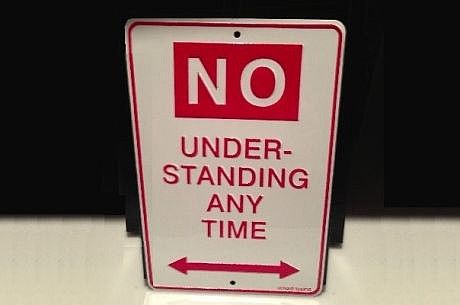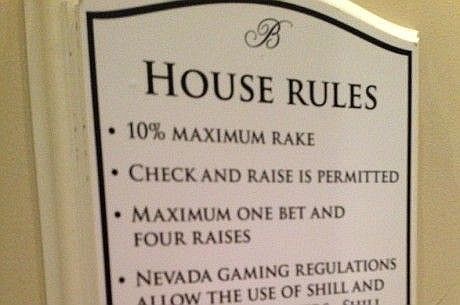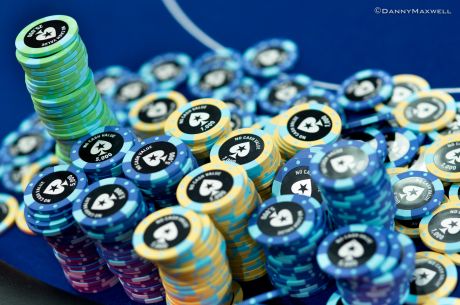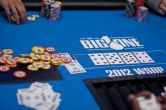New Poker Tournament Rules You Need to Know
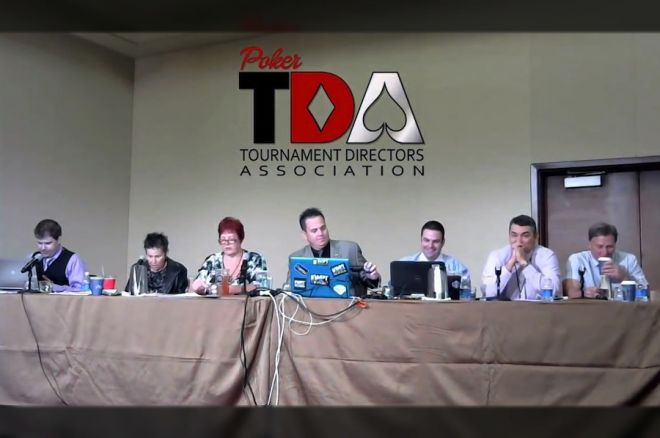
New Poker Tournament Rules
Most major poker tournaments, and many small ones, use the set of rules put out by the Poker Tournament Directors Association. For people who play tournaments on a regular basis, it��s worth being familiar with this rule book, so that situations don��t catch you by surprise.
The newest edition of the TDA poker tournament rules was just released last week. Many of the changes are minor improvements in wording, highly technical, dealing with extremely rare circumstances, or instructions on procedures for tournament staff that players don��t really need to know about. Let��s ignore those, and focus just on the ones that substantively affect all players.
Rule 2: Player Responsibilities
Added to the list of players�� responsibilities is ��call for a clock when warranted.�� Sometimes players are reluctant to call for a clock on a slow player because they don��t want to be the bad guy. Elevating it to a responsibility, rather than just an option, is a helpful change. There are situations where it needs to be done, and all players should feel equally empowered to be the one to speak up about it.
Rule 3: Official Terminology of Tournament Poker
New to the list: ��players must use gestures with caution when facing action; tapping the table is a check.��
This is a frequent problem �� specifically, some players absent-mindedly tap a hand on the felt while thinking about what to do, leaving other players to guess about whether the tapping is intended to signify a check, or just a careless habit.
It has always been generally understood that any motion that can reasonably be interpreted as a check will be so interpreted. Now, however, that is in writing, giving fair warning to all. If you are one who has this kind of habit, you��d better squelch it pronto. From now on, you can expect other players to be more aggressive in insisting that it be taken as your indication of checking, whether or not that��s what you intended.
Rule 12: Declarations. Card Speak at Showdown
��Any player in the hand or not, should speak up if he thinks a mistake is being made in reading hands or awarding the pot.��
Only the last four words are new. This has always been so as a matter of ethics. Now it��s a rule. If you notice such an error being made, you don��t have the option to remain silent about it.
Rule 13: Tabling Cards & Killing Winning Hand
��At showdown a player must protect his hand while waiting for it to be read.��
If the dealer has to read the hands to determine the winner, the best way to protect your claim to the pot is to keep your card protector or a finger on your face-up cards (but don��t obstruct the view of them) until either you��re sure that somebody else won or the dealer is pushing you the pot. In the latter case, consider the last step in the hand as a trade: your cards for the pot. Don��t let go of one until you have the other.
Rule 15: Face Up for All-Ins
��All hands will be tabled without delay once a player is all-in and all betting action by all other players in the hand is complete. No player who is either all-in or has called all betting action may muck his hand without tabling.��
Only the second sentence is new. It really just restates the first sentence, making explicit what was already clearly implicit there.
Rule 16: Non All-In Showdowns
��A non all-in showdown is uncontested if all but one player mucks face down without tabling. The last player with live cards wins and he is not required to show his cards.��
Some casinos have a nonstandard house rule �� or at least practice �� requiring that the winner show his hand even if a last-street bet has caused all opponents to fold. This never made any sense; such a rule was never imposed on similar action in earlier streets, so why should it when the same thing happens on the river? Anyway, for places that follow TDA rules, that practice is now out.
Rule 17: Asking to See a Hand
��If there was a river bet, any caller has an inalienable right to see the last aggressor��s hand on request (��the hand he paid to see��) provided the caller retains or has tabled his cards.��
This is an interesting and �� in my opinion �� unfavorable change.
Player A bets the river, Player B calls. The usual practice is for B to wait for A to show first. If A knows that he has been caught in a pure bluff and has no chance of having the winner, he has always been able to muck his cards unseen. Player B then gets the pot with neither hand shown. Similarly, if B, for whatever reason, decides to show first without waiting, and A sees that B has won, A has always been able to muck his cards, thus conceding the pot to B without showing.
This rule changes that. It gives B the right to see A��s cards in either of those situations. Even more strangely, it gives player B an ��inalienable�� right to see them �� the only player��s right in the whole lot that is declared to be ��inalienable.�� That��s odd wording, because a determined Player A can usually foil any such request by quickly pitching or shoving his cards into the muck pile, making them unidentifiable. How is a right ��inalienable�� if another player can deny it by such a simple action? I suppose that under this new rule, Player A could be penalized for denying B his ��inalienable�� right, but as far as I know, such a penalty has never before been applied.
My advice? If you��re Player B in such a scenario, don��t exercise the right this new rule gives you. Take the pot, and let Player A muck his cards in peace. There are two reasons for this. First, you��ll engender resentment if you insist on seeing a hand he wanted to throw away. Second, once in a while you��ll lose a pot that would have been yours, because Player A was mistakenly throwing away a winning hand. Let sleeping dogs lie.
Rule 27: Calling for a Clock
The new wording of this rule adds three nuances to the procedure:
1. ��Any player in the event may request a clock.�� Note that it��s not just any player at the table. This means that if you��re down to two tables, and players at the other table are stalling while your table is zipping through hands, you can call for a clock on a player at the other table!
2. The floor has to approve the request for a clock. This is usually automatic, but the added wording gives tournament staff the option to decline to apply the clock. This might be used if they feel that a player is abusing his right to call for it.
3. The previous version of the rules said that the tournament director could use a time shorter than the standard 60-second countdown. Now the reason for that authority is stated clearly: ��to fit the game format and stop persistent delays.��
Rule 29: At Your Seat
��A player must be at his seat when the last card is dealt on the initial deal in order to have a live hand.��
Perhaps the most controversial alteration in the 2013 TDA rules was to change what had been the traditional ��last card�� here to ��first card.�� The TDA has heard the protests from players, and has now switched it back, giving you a few more seconds to get to your seat without having your hand declared dead on arrival.
Rule 37: Methods of Betting: Verbal and Chips
��A: Bets are by verbal declaration and/or pushing out chips. If a player does both, whichever is first defines the bet. If simultaneous, a clear and reasonable verbal declaration takes precedence, otherwise the chips play.��
I think that��s self-explanatory.
Rule 39: Binding Declarations / Undercalls in Turn
��A: General verbal declarations in turn (such as ��Call�� or ��Raise��) commit a player to the full current action.��
This is making explicit what has always been general practice: If you say ��call,�� it is assumed that you know the size of the bet you are calling. If you missed a previous player��s raise or verbal declaration of ��all in,�� tough luck �� you��re on the hook for the full amount. It is every player��s obligation to know what the previous action has been before taking his turn.
��B: A player undercalls by declaring or pushing out less than the call amount without first declaring ��call.�� An undercall is a mandatory full call.��
Suppose the blinds are 500/1,000. The first player announces all-in for 10,000, but you miss it because you were busy texting your buddy about the bad beat you just took. After some folds, it��s your turn. You push out a stack of 2,000, thinking you��re making a minimum raise of the big blind. Sorry, you just called for 10,000.
However, some long verbiage that I didn��t quote gives the TD the option to let you forfeit just the 2,000 and fold, rather than commit the full amount, in some circumstances.
You must know what is going on. If you have any doubts, ask the dealer before making your decision.
Rule 43: Raise Amounts
��B: Without other clarifying information, declaring raise and an amount is the total bet. Ex[ample]: A opens for 2,000, B declares ��Raise, eight thousand.�� The total bet is 8,000.��
So if you mean to raise by 8,000, you have to make that explicit: ��Raise another 8,000,�� ��Plus 8,000,�� ��8,000 on top,�� or ��Raise to 10,000�� would all work.
Rule 60: Accidentally Killed/Fouled Hands
Newly added sentence: ��If a hand is fouled but can be identified, it remains in play despite cards exposed in the process.��
Your hand is ��fouled�� if another player��s cards come in contact with yours. The most problematic situation is when another player tries to pitch his cards into the muck, but misses and they land on top of, underneath, or interleafed with yours. There has long been a dispute about whether this should automatically kill your hand, or whether there should be leeway granted if it��s clear to everybody which cards are which.
This new rule comes down on the latter side of the argument. I think that��s right. If we can avoid killing a live hand on a technicality when there is no reasonable dispute about which cards belong to the player, that��s the way to go.
But criminy, people �� use a card protector! One that has more heft to it than a poker chip will help prevent this awkward situation.
Rule 66: Warnings, Penalties, & Disqualification
New addition: ��Players away from the table or on penalty may be anted or blinded out of a tournament.��
I don��t think there was any reasonable doubt that this has been the case all along, but making this explicit removes one more thing that an aggrieved player may think he can dispute.
And with that, we have reached the end of the list of rule changes that a typical player should know about. If you��re interested in a deep dive into the more technical changes, you can get them in several digital formats here.
Video still via Poker TDA, Poker TDA Summit, June 26-27, 2015, ARIA Resort & Casino.
Robert Woolley lives in Asheville, NC. He spent several years in Las Vegas and chronicled his life in poker on the ��Poker Grump�� blog.
Want to stay atop all the latest in the poker world? If so, make sure to get PokerNews updates on your social media outlets. Follow us on Twitter and find us on both Facebook and Google+!

